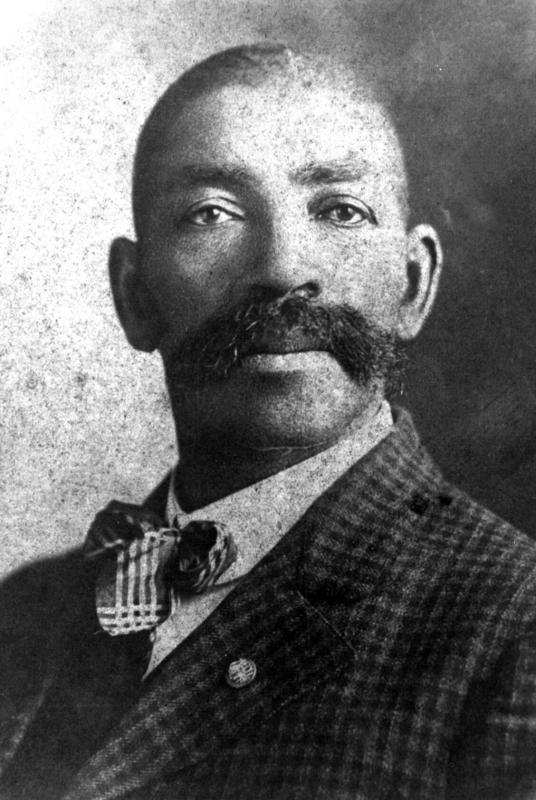Who Was the Real Bass Reeves?

- Oops!Something went wrong.Please try again later.
Who was the real Bass Reeves?
David Oyelowo takes an oath to protect and serve in the story of one of the most legendary—but unsung—lawmen in the Old West in Taylor Sheridan’s new Western Lawmen: Bass Reeves, which also stars Dennis Quaid (Sherrill Lynn) and Donald Sutherland (Judge Parker). The first chapter in the anthology series follows Bass Reeves’ rise from enslavement to law enforcement as the first Black U.S. Marshal west of the Mississippi.
How did a former slave become a legend? Here’s the real Bass Reeves story.
Who was the real Bass Reeves?
Horse thieves, murderers, robbers, whiskey peddlers and other assorted thugs ran rampant in Indian Territory (now Oklahoma) in the early 1870s. To bring law and order to the area, President Ulysses S. Grant appointed Isaac C. Parker judge of the U.S. Court for the Western District of Arkansas, who then recruited James Fagan to be U.S. Marshal and authorized him to hire 200 deputy marshals to police the 74,000 square miles of Indian Territory. Parker told the new deputies to clean up the territory and reportedly said, “Bring them in alive—or dead!” One of those deputies was Bass Reeves, the only Black man hired.
Related: 'Frasier,' 'Fargo,' 'NCIS: Sydney' and More! These Are the 19 Best Fall TV Shows in '23
Born into slavery in Arkansas in 1838, Bass Reeves was taken by his master to Texas in 1846. At some point, he escaped and fled north to Indian Territory, where he lived among the Cherokees, Seminoles and Creeks, learning their customs, languages and the lay of the land. He picked up tracking, stalking and survival skills, and developed a keen eye and a fast gun. When the Emancipation Proclamation took effect in 1863 and Reeves was no longer a fugitive, he returned to Arkansas, bought a farm and married.
After the Civil War, he worked as an interpreter for settlers returning to Indian Territory. When railroads were being constructed there, he helped protect surveyors and, later, construction workers from being fleeced of their earnings by con men.
Was Bass Reeves a slave?
When he became a deputy, some people questioned whether a former slave should carry a gun, make arrests, serve subpoenas, summonses and warrants—and handle federal prisoners. But many skeptics grew to respect Reeves. He had a strong sense of right and wrong as well as a dedication to duty. He believed in equality for all citizens.
Reeves never learned to read or write, but he memorized the warrants as they were read to him and never brought in the wrong person. In fact, he became so adept at catching criminals that they often surrendered because they knew the jig was up.
Related: Taylor Sheridan's Ever-Expanding Universe: A Complete List of His Many Paramount Series and Movies

REPRINTED COURTESY HARRIS’ FARMER’S ALMANAC
As a deputy marshal, Reeves traveled with a chuckwagon and cook, a posseman (guard) and a tumbleweed wagon (jail on wheels) to transport captives. Standing 6 feet tall and weighing 180 pounds, he was an imposing figure in the saddle.
Did Bass Reeves arrest his son?
With numerous warrants in hand, Reeves would be gone from his home for months—tracking down outlaws, sleeping outside in all kinds of weather, having shootouts with criminals and bringing in as many as 17 desperados at a time—all for a pittance. He relished the chase and the challenge. Altogether Reeves arrested more than 3,000 men and women. Honest and incorruptible, Reeves always followed the letter of the law, even tracking and arresting his son Ben, who had shot and killed his wife.
How did Bass Reeves die?
In 1907, Reeves’ 32-year career as a U.S. deputy marshal ended when Oklahoma became a state, and the federal government was no longer responsible for enforcing law in what had been Indian Territory. Reeves had worked longer than any other deputy in the Western District, serving 21 of those years under Judge Parker. For a brief period, he was a U.S. Marshal in Paris, Texas, then he spent two years as a policeman in Muskogee, Okla., where not a single crime was committed on his watch. Even though he walked with a cane, he was still a striking figure. He retired in 1909. On Jan. 12, 1910, Bass Reeves died of Bright's disease (nephritis).
Hundreds of people attended his funeral. Fellow lawman Bud Ledbetter said Reeves was “one of the bravest men this country has ever known.” Reeves was inducted into the Hall of Great Westerners of the National Cowboy & Western Heritage Museum in Oklahoma City in 1992. Twenty years later, a bronze statue of Reeves by Harold T. Holden was erected at Pendergraft Park in Fort Smith, Ark. It portrays the lawman on his horse and holding a rifle, with his dog running by his side. Each year in July, the Bass Reeves Western History Conference is held in Muskogee, Okla.
Go to 3riversmuseum.com for more information.
Watch Lawmen: Bass Reeves only on Paramount+ starting Nov. 5.
Related: Everything You Need to Know About 'Lawmen: Bass Reeves'
—Diana West
REPRINTED COURTESY HARRIS’ FARMER’S ALMANAC

